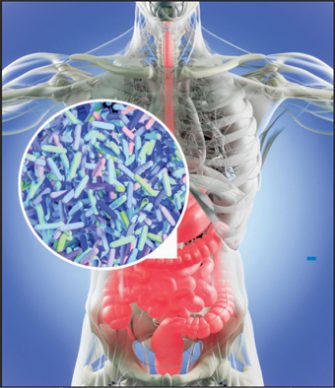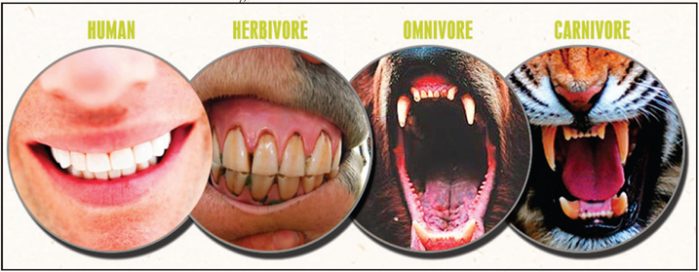Our teenage correspondent offers evidence supporting a vegetarian diet, including human and animal anatomy, biochemistry and more
BY MAYURESH VISSWANATHAN,
CARLSBAD, CALIFORNIA
HUMAN SOCIETIES ALL ACROSS THE globe have consumed meat for thousands of years. Their cuisine has included traditional farm animals, such as cows, pigs, chickens, and goats, as well as seafood, including fish and crustaceans. Some may argue that meat eating has been an essential part of human history and evolution and is an intrinsic part of our culture today.
However, there are a few societies on Earth today that follow herbivorous diets rather than omnivorous diets. These vegetarian or vegan societies can be found throughout the subcontinent of India, where hundreds of millions of people have abstained from eating meat for the last few thousand years.
The meat-eating debate has been long and drawn out. Many oppose meat eating because it causes himsa, or violence, to other beings on this planet. Those who support meat eating claim that it is needed for a complete diet and is simply a natural cycle that we must fulfill in order to survive.
Compelling evidence has risen within the past decade or so that sheds new light on this topic. Ground-breaking studies show not only that we do not need meat for our survival, but in fact it is harming those who consume it. Herbivorous diets are the perfect diets for humans because our anatomy is specifically tailored to vegetarian/vegan diets. Our anatomical features and health benefits prove it.
To understand why a herbivorous diet is the best for our anatomy, it is first important to identify the unique features of the digestive system of a carnivore, herbivore, and finally an omnivore. Carnivores are organisms that eat exclusively meat and do not need plant matter for their bodies to function. All carnivores have sharp teeth for tearing meat. They do not possess flat molars in the back of their mouth for chewing plant matter. When they tear off a piece of meat, they do not chew it; they tend to swallow the chunks of it whole. This is because carnivores do not secrete amylase in their saliva, unlike herbivores. Amylase, an enzyme that pre-digests carbohydrates in the mouth, is only found in multicellular organisms that consume plants. Also, the digestive tract of a carnivore is normally five to six times the length of its torso and is relatively linear, rather than intricately coiled up or folded over. This digestive tract allows for the fast digestion of meat, assuring that the flesh does not putrefy within the intestines.

Also, because they eat their meat raw, and uncooked, all carnivores have a stomach pH of less than 2.0. Such an extremely acidic pH allows for the destruction of bacteria and parasites that dwell on the flesh of rotting carcasses. Even true omnivores can consume raw meat, as their stomach pH can effectively handle the harmful parasites on the meat.
Herbivores are organisms that eat solely plant matter for their bodies to function. All herbivores have flat teeth, including flat molars in the back of their mouths to allow them to mash and grind up tough plant material. Unlike carnivores, herbivores can also move their mouth from side to side, instead of just up and down like a carnivore. This process further aids the herbivore in chewing plant matter. Another key characteristic of the herbivore is their unique digestive tract. All herbivores have intestinal tracts that are folded up and extremely long, usually multiple times the length of their body. This arrangement allows for a thorough breakdown of plants for optimal nutrient absorption. Digestion in an herbivore starts in the mouth, unlike a carnivore. Herbivores must chew their food before swallowing it. This helps to pre-digest it before it reaches the stomach, and then the intestines. Unlike a carnivore, the saliva of an herbivore contains amylase, which is useful for breaking down carbohydrates in the mouth. Not many parasites or harmful bacteria grow on plants, so herbivores do not need an extremely low stomach pH. Their stomach pH tends to be more basic (alkaline) than that of a carnivore.
Omnivores are organisms that eat both plants and animals. Humans are widely considered to be omnivores, but this is quite incorrect. To correctly explain the anatomy of an omnivore, it is best to use an ideal example, such as a bear.
Bears are truly omnivorous creatures; over half their diet consists of plant matter and a moderate portion consists of meat. For omnivores to be successful, it is vital that they have sharp teeth and claws. The digestive system must be well suited to digesting meat, even if the diet is mostly herbivorous, because raw meat has the potential to inflict serious illness or death on the creature.
Accordingly, bears have sharp teeth and sharp claws, and their digestive tract is similar to that of a carnivore—short and highly acidic. To help consume herbivorous food, they have flat molars in the back of their mouth, and they chew their food instead of swallowing it whole. These traits can be observed in other omnivorous creatures such as domesticated canines (dogs), and raccoons.
The anatomy of a human is strikingly similar to that of an herbivore. Our teeth are designed to grind and chew plant matter. In fact, we have additional molars, called wisdom teeth, in the back of our mouth to further help us chew hard-to-digest foods such as roots, tubers, and foliage. Our jaws can move not only up and down, but also side to side, unlike carnivores. The most striking thing, however, is our digestive system. It is long and coiled, just like a herbivore; and our saliva contains amylase, which helps to break down starches or carbohydrates in our food. Our stomach pH also is similar to that of an herbivore—around 4-5 when consuming food, much less acid than that of a carnivore.
Humans are anatomically not omnivores. Our digestive tract is not like that of carnivores, we do not have sharp teeth or nails, and we normally do NOT eat raw meat. Humans are the only animals that cook their food, and the food that must be cooked before it is consumed is meat. Plant matter doesn’t have to be cooked to be safe to consume, although it is advised that you cook most of the food you consume.

If we were true omnivores, we would have the capability of eating raw meat. Our stomach pH does not support the consumption of raw meat. Moreover, if we were designed as omnivores, we would have the capability of eating raw meat without even chewing it. We would be able to tear off chunks of meat and swallow them whole, with no issue whatsoever. Researchers from Harvard University have concluded that humans do not have the necessary gut flora to properly digest meat, even if it is cooked. In this study, researchers had two groups of subjects. For five days, one group could only eat meat and dairy for all three meals. The other group was restricted to a herbivorous diet which included fruits, vegetables, leafy greens, tubers, and legumes.
Their results were astonishing, even though the experiment lasted for only five days. The meat group had an explosion of the bacteria Bilophila. This Harvard study, published in the reputed scientific journal Nature, demonstrated that, “increases in the abundance and activity of Bilophila wadsworthia on the animal-based diet support a link between dietary fat, bile acids, and the outgrowth of microorganisms capable of triggering inflammatory bowel disease.” Their entire intestine became filled with it within just a day or two. While this bacteria has the ability to digest stomach fats, it does not have the ability to digest meat particles. The worst part is that Bilophila has been shown to cause intestinal inflammation and colitis, which has been verified through trials on mice. A meat-rich diet would actually promote the destruction of our own intestines, as our intestinal walls would become severely inflamed.
Even when given scientific data, many people are adamant that humans are truly meant to eat meat. They argue that some societies have lived on meat-dominant diets for thousands of years and have not had many health problems. They offer examples such as the Eskimos, an Arctic-dwelling people who mainly live on whale, caribou and fish throughout the entire year, only eating grasses, roots and tubers during the two summer months.

Furthermore, meat-eating proponents correctly claim that many vegetarians and vegans suffer from B12 vitamin deficiencies. They also argue that the purpose of our canine teeth is for tearing meat, which therefore justifies the consumption of meat. Their biggest argument is that meat was actually needed by our ancestors to evolve into modern-day humans. There are many issues with these arguments, although each contains elements of truth.
Firstly, it is true that people have been eating meat for thousands of years. However, it is not true that they have had few health problems. The Eskimo are a prime example of a modern-day people that still live a lifestyle that was prevalent hundreds of years ago. Experts and scientists have long marveled at this lifestyle because the Eskimo eat meat at every single meal, without much or any plant matter, and still look healthy and happy. But looks can be deceiving. The average lifespan of an Eskimo is in the 60s, while the average lifespan of others today is 80. They suffer from many ailments common to heavy meat eaters, such as atherosclerosis, a condition in which the arteries harden due to the deposition of fat and plaque on the walls of the arteries. Twelve percent of the Eskimo population suffers from internal parasites due to the consumption of meat, including raw meat.
Vitamin B12 is essential to the human digestive system. Although it is true that vegans and vegetarians may suffer from B12 deficiencies, it does not mean that meat is essential to the human diet. It is a common misunderstanding that the only natural source of vitamin B12 is meat. Vitamin B12 comes from bacteria that reside in the soil. Meat is rich in B12 because the animal, most likely an herbivore, ate food directly from the soil such as grass, or seed. Back in the day, our ancestors were able to consume adequate amounts of B12 through the consumption of plants straight from the soil.

Nowadays, however, our food is so clean and free of dirt that we cannot benefit from the B12 supplementation that soil provides. It is still recommended, however, that you continue to wash your foods in order to get rid of any pesticides that may be on the produce. The only way that it would be safe to eat “unclean” produce would be to grow it yourself in an environment without pesticides, such as a home garden. Luckily, vegetarians can also obtain B12 from yogurt, since it is rich in beneficial bacteria.
Another false argument that people use is the classic canine teeth argument. “If we weren’t meant to eat meat, why do I have these sharp, meat eating teeth in my mouth?” What do gorillas and hippos have in common? They both have intimidatingly large canines that are quite sharp. Both happen to be herbivores. Why do herbivores have canine teeth? Scientists have noticed that gorillas and hippos do not use their canine teeth for food consumption, but rather for defensive tactics. When threatened by a predator, or another member of their own species, they will often display their sharp canines to intimidate the aggressor. If the fight escalates, they can use them to good advantage. Scientists theorize that early humans used their canines in the same way, but these teeth have become a vestigial body part now; we do not display our teeth as a sign of aggression or defense.
The final and most prevalent argument that people use to defend their meat-eating habits is that humanity’s early ancestors needed meat to gradually develop and sustain the larger brain that is found in humans of today. This is entirely false. It has been proven by various studies that it was not meat that made us humans. In fact, it was cooked starches that allowed us to evolve with bigger brains. Carbohydrates are without doubt the best source of immediate energy, and carbohydrates are fully capable of supporting a human brain alone. Protein and fat are far less efficient. Further, it has been proven that protein and fat alone cannot support an enlarged brain because the brain needs so much energy. It is a common misunderstanding that meat is a great source of energy. That is not true. Carbohydrates are typically found in starchy foods such as yams, beets, and potatoes.
“Eat food. Not too much. Mostly plants.” Michael Pollan
In a 2016 study published by the scientific journal, Quaternary International, researchers asserted that, “Starchy plant foods provide the energy needed to support an enlarged brain…”
We started to develop the bigger brain once we learned how to cook. Cooked, starches such as potatoes are 20 times easier to digest than in their raw form. This huge advancement allowed us to expend less energy digesting food, which in turn allowed more energy for the brain to use.
The benefits of a herbivorous diet are vast, which further proves that the human diet was simply not meant to include meat. Vegetarians and vegans suffer less from atherosclerosis, colon cancer, heart disease, and high cholesterol levels, because they do not eat meat.
If humans were true omnivores anatomically, none of these diseases would affect us. Carnivores and omnivores do not get clogged arteries from meat, nor do they get cholesterol-related heart diseases. Vegetarians and vegans also have a longer lifespan on average and tend to be less obese.
A peer-reviewed 2003 Oxford University study of 37,875 healthy men and women aged 20-97 showed that 3% of vegetarians suffered from obesity versus 5.4% of meat eaters suffered from obesity. Followers of a diet that included meat also had an average Body Mass Index (BMI) that was 8.3% higher than vegetarians. To further support this finding, a 2006 meta-study comprised from data gathered from 87 studies found that vegetarian diets are associated with reduced body weight. A reduced BMI proves that not only are vegetarians lighter, but that they will generally be healthier as well because many diseases are a by-product of obesity, such as coronary artery disease and hypertension. The lighter weight of vegetarians is attributed to the fact that the diet is nutrient rich, yet low in calories. Many meat consumers are obese because the amount of calories in a portion of meat a lot more than compared to the same portion of vegetables. In this way, followers of a herbivorous can lose weight because they still become full, but without the unnecessary calories. Additionally, meat eating can increase your chances of getting colon cancer. According to a peer-reviewed 1994 study by Harvard researchers, consuming meats such as beef, pork, or lamb at least 5 times a week can drastically increase chances of developing colon cancer. Eating processed meats such as bacon or sausage can further increase the chance of colon cancer, as discovered by The World Cancer Research Fund. Many people are concerned that plant based proteins aren’t up to par with their animal based counterparts. However, a 2014 study found people who got their protein from animal products were four times more likely to die of cancer than people who obtained their protein from plant based sources. Lastly, vegetarians and vegans usually have lower cholesterol levels than meat-eaters, which is good for preventing cholesterol-related heart diseases. The lower cholesterol levels can be attributed to the fact that plants don’t contain cholesterol, whereas animal products do. The health benefits of vegetarian and vegan diets are plentiful, and it has been shown that a plant based lifestyle could prove to be more healthy than one based on meat.
After learning how destructive the consumption of meat can be to one’s digestive system, it is natural to wonder, “Why have humans been consuming meat for the past few thousand years if it was so bad for us this entire time?” A few thousand years ago, meat was a rare commodity. It is a common misunderstanding that most ancient people ate meat every day. Most of their diet consisted of seeds, nuts, berries, roots, tubers, vegetables, and fruits. Hunting took a lot of time and energy, and hunting technology was quite basic compared to the hunting gear of today. Meat was not easy to come by. When people did have meat, they would often split one animal among many people and would only get a few bites in a meal. Diets in which meat made up a small portion were prevalent throughout almost all societies on Earth, with few exceptions, like the Eskimo and other pastoral peoples, who mainly lived off animal products. Most societies did not suffer from diabetes, heart disease, and atherosclerosis, which are all common ailments of heavy meat eaters.
With the swift increase in globalization, the demand for meat has skyrocketed, especially in Eastern countries that in the past consumed lower meat quantities. Now, meat makes up a big portion of people’s diet around the world. Fruits and vegetables are now the rarer commodity in most households. This unhealthy overconsumption of meat has caused the health problems we now see today.
Humans went from a mostly vegetarian diet to a mostly carnivorous diet within the last hundred or so years. Our bodies would need more time to evolve to adapt to a diet filled with meat and processed foods; we, as a species, have not yet adapted to this burden. Hence, we are now facing the consequences of a quick, but major dietary shift.
In summary, humans were not created to consume meat. Our anatomy is not similar to that of a carnivore or an omnivore, and we suffer from many diseases that are linked to meat consumption. There are endless benefits to a herbivorous diet, which anyone can experience for themselves if they try it. Though it may be hard to say goodbye to fried chicken and the monthly neighborhood barbecue, your body will thank you in the long run.

A Healthy Relationship with Food

IF YOU ARE NOT ALREADY CONCERNED WITH THE DIRECTION THAT MAINSTREAM FOOD HAS TAKEN, Professors Peter Singer and Michael Pollan think you should be. In The Ethics of What We Eat, Why Our Food Choices Matter, Dr. Singer and animal rights activist Jim Mason show how eating meat, poultry, fish and factory-farmed dairy products not only contributes to animal abuse, but also environmental degradation, social injustice and climate change. For further insights and earthy alternatives, we refer to Michael Pollan’s 2010 bestseller, Food Rules. He’s been compared to Mark Twain in his literary genius. Skipping his recommendations on eating flesh, you will, as we did, find his 64 rules for better eating remarkably sensible, and funny as well. Explore Pollan’s impressive set of food books, they will make you stop and think before buying factory raised flesh or processed foods.
